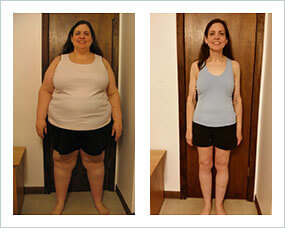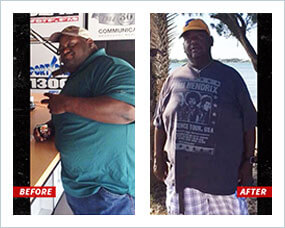Bariatric surgery, also called weight loss surgery, includes a range of surgical and non-surgical procedures that lead to significant and rapid weight loss and health improvement.
The tools and information below will help you understand what to expect if you decide to move forward.
TABLE OF CONTENTS
Click on any of the topics below to jump directly to that section
- What Is Bariatric Surgery?
- Procedures Types
- Best Procedure
- Is It Safe?
- How Much Weight Will You Lose?
- Health Improvement
- Before & After Pics
- How to Qualify
- Cost
- Insurance
- Required Diet Changes
- Downsides
- Next Steps
- Find a Weight Loss Surgeon

Bariatric surgery definition:
Bariatric surgery includes a variety of procedures performed on people who have obesity. Significant and rapid weight loss and the resulting health improvements are achieved by one or more of the following, depending on the procedure:
- Restriction
Feel full sooner while eating and feel less hungry by reducing the amount of contents that the stomach can hold - Malabsorption
Absorb fewer calories and/or minerals - Aspiration
Remove food from the stomach after eating - Vagal Nerve Blocking
Feel full sooner while eating and feel less hungry between meals by directly stimulating the nerve that sends hunger signals from the stomach to the brain
There are 6 types of bariatric surgery to choose from, including (tap links for more information):
There is no “one size fits all” bariatric surgery procedure. Each has its own pros and cons to consider before making a decision. For example:
- Gastric sleeve, gastric bypass, and duodenal switch result in the most weight loss and greatest health improvement but also have longer hospital stays and recovery times and more dietary restrictions
- LAP-BAND® weight loss is almost as good as sleeve, bypass, and duodenal switch, but it has a lower long-term success rate and requires more follow up visits with your doctor
- Gastric balloon is the least expensive, is non-surgical, and has the quickest recovery, but it must be removed in 6 months
- AspireAssist has the fewest diet restrictions, but it is not covered by insurance, and fewer doctors perform it
Take the Bariatric Surgery Quiz to find out which 2 procedures are best for you and why.
For a complete procedure comparison, see our Types of Weight Loss Surgery page.
While bariatric surgery carries the same general risks associated with any type of surgery, its safety profile is impressive and its upsides tend to outweigh its risks.
Points to consider include:
- Bariatric surgery has a 99.9% survival rate (1)
- Complications ranging from minor (more common) to serious (less common) are experienced by about 1 in 10 patients (2)
- The long-term risks of remaining obese are much greater than the risks of bariatric surgery. For example, individuals suffering from obesity are 50% more likely to die over any period of time than weight loss surgery patients (3)
Weight loss surgery’s safety profile combined with its effectiveness have led many reputable health and governmental organizations to recommend bariatric surgery for individuals who qualify, including:
- American Diabetes Association
- American Heart Association
- Centers for Medicare & Medicaid
- International Diabetes Federation
- National Heart, Lung, & Blood Institute
- National Institute of Diabetes and Digestive and Kidney Diseases
- The Obesity Society
Finally, there are several ways you can minimize your risk of complications, such as choosing an experienced surgeon and following their advice to the letter.
See our “Is Weight Loss Surgery Safe?” page for more information.
You will start losing weight fast after any bariatric surgery procedure, but the total amount lost varies based on:
- The procedure you choose
- How closely you follow your doctor’s instructions
For example, depending on your height and weight and chosen procedure, you could lose as little as 25 pounds or as much as 125 pounds in 1 to 2 years.
Tap the button below and enter your information into the tool to get an idea about how much weight you’ll lose after each procedure:
Bariatric surgery “cures” or significantly improves many obesity-related health conditions, including:
- Diabetes
- Sleep apnea
- Hypertension
- Joint issues
- … and many others
Select your health conditions in the tool below, then click the Submit button to find out the impact a procedure like gastric sleeve can have:
Click Here to See A Full List of Health Benefits
Scroll through the images below to see before and after pictures of actual bariatric surgery patients.























How much weight will you lose after bariatric surgery?
Click here to calculate how much weight you'll lose in the first yearBefore and after weight loss success
Individual results may vary
Depending on the procedure, many patients lose up to 100 pounds (45 kg) or more during the first 12 to 18 months after bariatric surgery.
In other words, you will become dramatically thinner very quickly.
However, there’s likely to be a trade-off when you’re naked: your skin’s elasticity won’t be able to keep up with your rapid weight loss, and it may start sagging. Some patients are able to deal with it while others eventually have plastic surgery to remove the excess skin.
Patients who qualify for bariatric surgery usually:
- Are at least 80 lbs (36 kg) overweight
- Are between 18 and 75 years old
- Have a history of failed weight loss attempts (e.g., failed diets)
- Thoroughly understand that the procedure is just a tool; long-term success requires significant diet and lifestyle changes
The minimum bariatric surgery qualifications include:
- A body mass index (BMI) of 40 or more
- OR a BMI between 30 and 39.9 with a serious obesity-related health problem like diabetes, high blood pressure, sleep apnea, high cholesterol, joint problems, or others
- OR a BMI of 30 to 40 with or without health issues for the gastric balloon procedure
Qualification requirements are a bit more stringent if you want insurance to pay, such as requiring a 35+ BMI and a completed medically supervised weight loss program.

Your out-of-pocket bariatric surgery cost can range anywhere from $0 to $20,000 or more depending on several factors, including:
- Whether your insurance covers it – many insurances (including Medicare, Medicaid, and many individual/family and employer-provided policies) cover the majority of costs for gastric sleeve, gastric bypass, LAP-BAND®, and duodenal switch. The other types of bariatric surgery are less likely to be covered, although you may be able to get insurance to pay for some of the costs. See the Insurance section below to find out if your plan covers it.
- Which procedure you choose – if insurance won’t pay, costs range anywhere from $8,000 to $20,000+, depending on the procedure. Below are the average costs per procedure nation-wide, but some surgeons offer each procedure for as low as half of the national average.
- How competitive your surgeon and hospital fees are – there is often a substantial difference in costs between different doctors and hospitals, even within the same town.
- Whether you qualify for tax write-offs – Bariatric surgery is tax deductible, which can have a big impact on the total cost of surgery. You can deduct medical expenses if your out-of-pocket costs are more than 10% of your adjusted gross income.
- How you choose to pay for your procedure – If insurance covers it, you’ll only be responsible for any copays, deductibles, and coinsurance required by your specific plan. If you pay for the procedure without insurance, total costs will depend on how you pay. For example, your surgeon may offer a discount if you pay the full amount up front, and you can make the costs more affordable by applying for bariatric surgery financing.
See our Bariatric Surgery Costs page for more details, including a full cost breakdown, state-by-state averages, and a tax tool.
Bariatric surgery insurance coverage varies by insurance policy:
- Individual/Family Plans & Small Group Plans – Coverage varies by state; coverage is required by the Affordable Care Act in some states
- Large Group Plans – Coverage depends on whether your employer has chosen to add it to your policy
- Medicare and Medicaid – Bariatric surgery is covered
If your policy covers it and you meet the qualification requirements, your plan will likely include 4 procedures:
- Gastric sleeve
- Gastric bypass
- LAP-BAND®
- Duodenal switch
Your surgeon may be able to get partial coverage for the other procedures.
Click Here to Check Your InsuranceSee our Bariatric Surgery Insurance page for more information.

Most bariatric surgery procedures require significant changes to your diet both before and after your procedure.
Pre-Bariatric Surgery Diet
Eating right before surgery will lower your risk of complications and lead to more long-term weight loss.
Requirements for each procedure are different, but most pre-bariatric surgery diets include:
- Healthy food choices
- Lots of protein
- Low-carbohydrates
- Plenty of fluids
- Certain bariatric vitamins, depending on your lab work results
See our Bariatric Diet page for more details about your pre-surgery diet.
Post-Bariatric Surgery Diet
After surgery you will slowly transition from a clear liquid diet to solid foods. Each surgeon is different in their approach, but the typical transition schedule lasts from 4 to 6 weeks.
Once you’ve fully transitioned, your new long-term bariatric diet will include:
- Healthy “whole” foods (avoid anything that’s processed)
- High protein
- Minimal sugar and “simple” carbohydrates
- Plenty of non-sugary fluids
- Minimal snacking
- Smaller portion sizes
- Slower and more thorough chewing
- No drinks with meals
- Strict regimen of bariatric vitamins and supplements
- Minimal alcohol
Again, diet restrictions and implications if you “cheat” are different for each procedure. For example:
- Gastric sleeve patients risk stretching out their smaller stomachs if they overeat, resulting in weight regain. They may also have difficulty swallowing if they eat too fast.
- Gastric bypass patients often cannot tolerate ANY sugar without experiencing unpleasant digestive issues (“dumping syndrome”).
- LAP-BAND® patients often experience difficulty swallowing if they try to eat too fast, and they can’t eat or drink anything within 30 minutes of meals.
- Duodenal switch patients have much stricter vitamin regimen to prevent malnutrition, in addition to the same issues as gastric sleeve patients.
- AspireAssist has minimal diet restrictions but typically much less weight loss than the procedures above.
- Gastric balloon patients only need to avoid “sticky” foods that can cling to the implanted balloons, but like AspireAssist, they also experience less weight loss. In addition, gastric balloons must be removed after 6 months.
For a deep dive into what your diet will look like before and after surgery and how each procedure is different, see our Bariatric Diet page.
While most patients call bariatric surgery the best decision of their life, it comes at the cost of:
- Big lifestyle changes
- A recovery period after surgery
- Risk of complications
- Possible side effects
Big Lifestyle Changes
You will lose a lot of weight very quickly after bariatric surgery.
Your family, friends, and coworkers will start making comments about your weight, and you will likely receive more romantic attention.
The obesity discrimination you experience will go away. Strangers will treat you with more kindness and respect, often leading bariatric patients to feel like they’ve stepped into an “alternate universe.”
But all of these positive effects come with some big lifestyle trade-offs.
First, the diet changes listed above will have a big impact on your day-to-day life:
- You may not be able to eat the same things as those around you, which may be awkward.
- Your portion sizes will be much smaller, so you’ll have to eat much more slowly than you’re used to in order to “keep pace” with others around the table.
- You will become religious about your vitamin, protein, and fluid intake.
- Alcohol should be avoided (or kept to a minimum).
Simply put, you will have a different relationship with food than you have ever had in your life.
You will also need to start a regular exercise program 2 to 3 days per week for 30 minutes each day. Many patients come to love the way they feel after exercising, but it will be a transition.
Finally, many patients report feelings of jealousy and resentment from friends and family members who still struggle with their weight.
For more on the positives and negatives to expect after surgery, see our Life After Weight Loss Surgery page.
Bariatric Surgery Recovery Period
Bariatric surgery recovery varies by procedure. Here are the ranges:
- Timeline Range: from 3 days to 6 weeks to full recovery
- Hospital Stay: from outpatient (return home same-day) to 3 days
- Back to Work: from 3 days to 3 weeks
- Pain Range: from mild discomfort to manageable with medication
- Diet Range: from no restrictions to slow transition from clear liquids to solid foods
- Activity Range: from no restrictions to slow transition back to regular activity and exercise
See our Bariatric Surgery Recovery page for details by procedure and a complete Recovery Timeline.
Bariatric Surgery Complications
While the survival rate for bariatric surgery is extremely high at 99.9%, as many as 1 in 10 patients do experience complications.
As with most other aspects of surgery, this varies widely by procedure type. For example:
- Procedures that result in greater weight loss tend to carry greater risk because they alter your anatomy. Anatomy-altering procedures include gastric sleeve, gastric bypass, and duodenal switch.
- Procedures that do not alter your anatomy usually result in less weight loss and have less risk. Non-anatomy altering procedures include gastric balloon and AspireAssist.
- LAP-BAND® is in a category of its own. It has weight loss just under more invasive procedures like gastric sleeve but does not alter the anatomy. However, the implanted band can lead to unique band-related complications which occur in a relatively high percentage of patients, especially those who do not follow post-surgical guidelines closely.
See our Bariatric Surgery Complications page for more information.
Bariatric Surgery Side Effects
Bariatric surgery side effects range from minimal to extensive, depending on the procedure.
The most common side effects include:
- Digestion issues such as difficulty swallowing, constipation, diarrhea, nausea, or intolerance to certain foods
- Sagging skin from rapid weight loss (correctable through plastic surgery, depending on the severity)
- Vitamin or mineral deficiency, especially after gastric bypass and duodenal switch
- Gallstone formation (as a result of rapid weight loss – usually temporary)
- Hair loss (as a result of rapid weight loss – usually temporary)
For more information on side effects by procedure, click these procedure links and see the “Downsides” section:

First, congratulations on deciding to move forward!
You have a few choices to get the process started with your bariatric surgeon:
- Free Insurance Check – Most bariatric surgery practices will contact your insurance company on your behalf to figure out your coverage levels. If you haven’t done so already, fill out their online form or call them to share your insurance and contact information.
- Initial Consult – After your doctor’s office confirms your insurance or self-pay options, you’ll sit down with your surgeon one-on-one to discuss your options.
- Free Online or In-Person Seminar – Many surgeons hold regular (weekly) seminars or webinars to talk about your options, introduce themselves and their staff, and allow you to interact with others who are also considering surgery. If you don’t want to jump straight into a one-on-one consultation, consider attending a seminar or webinar with other prospective patients.
- Existing Patient Support Group Meeting Schedule/Location – If you’re still on the fence about having a weight loss procedure, attending a local support group will give you a much better understanding of the benefits and challenges of weight loss surgery from actual patients.
- Free Online or In-Person Seminar – Many surgeons hold regular (weekly) seminars to talk about your options, introduce themselves and their staff, and allow you to interact with others who are also considering surgery. If you don’t want to jump straight into a one-on-one consultation, consider attending a seminar with other prospective patients.
- Existing Patient Support Group Meeting Schedule/Location – If you’re still on the fence about having a weight loss procedure, attending a local support group will give you a much better understanding of the benefits and challenges of weight loss surgery from actual patients.



